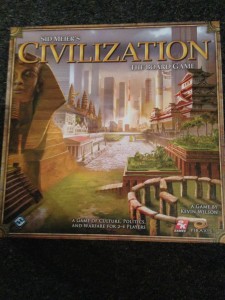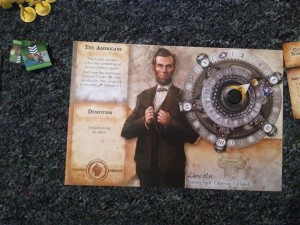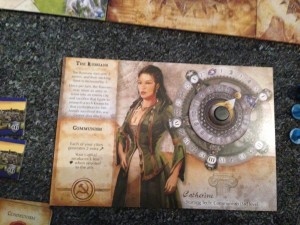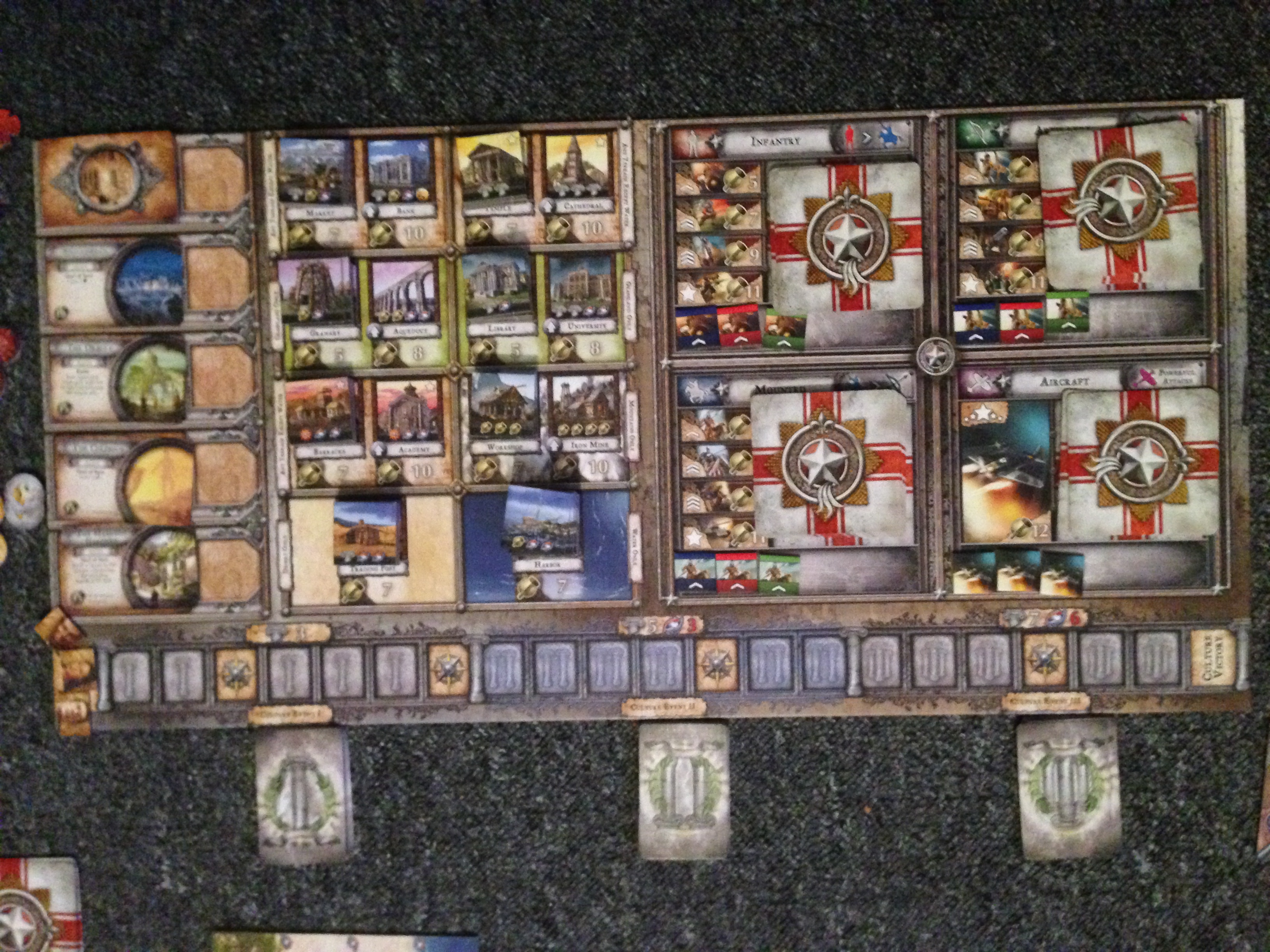Videogames and Boardgames have a strange relationship sometimes. There are hundreds of examples of videogame versions of boardgames such as Fluxx, Settlers of Catan and Carcasonne. These are rather close translations and work extremely well. To find a direct translation from a videogame to a boardgame however is a very difficult task. This is mainly down to the fact that that you can’t really translate certain videogame gameplay mechanics into a boardgame. So what you end up with is a game set in the universe of the videogame a la Bioshock Infinite: The Siege of Columbia. One of the few exceptions to this is this week’s game, Cid Meier’s Civilization the boardgame. And seeing as the point of Cards, Dice & Tabletops is to try and get more videogamers into board gaming, we shall be making endless comparisons to the videogame series to see if Civilization the boardgame can tear us away from our screens.
 Civilization the boardgame aims to be a direct port of the videogame transferred to your table top. It does a damn fine job of this but it does come with a price – time. It is a game for two to four players with a playtime of two to four hours per game. Add to this a rather lengthy setup time of close to an hour and your afternoon has become fully booked. There are also a lot of bits and pieces that go into the boardgame version of Civilization. There is the market board that contains all the buildings and types of military units that you can produce. The board also tracks how cultured you civilization is becoming and also houses the cultural events cards. Add to this the map tiles that are laid out in a specific pattern depending on number of players; player civilization sheets; tokens signifying money, culture, wonders, great people and units; plastic counters for armies and settlers; resource counters and you are merely scratching the surface of the components that make up this game. Seeing of all them laid out at first is a little overwhelming but then the realisation that this boardgame has everything the videogame has turns that into comfort. Nothing of consequence has been left out of the Civilization the boardgame. There are still four ways to win the game (Cultural victory, Technological victory, Economic victory and a Military victory) and you still need to manage all your armies, cities, cultural activities and government choices. In short, you are playing Civilization IV without the PC.
Civilization the boardgame aims to be a direct port of the videogame transferred to your table top. It does a damn fine job of this but it does come with a price – time. It is a game for two to four players with a playtime of two to four hours per game. Add to this a rather lengthy setup time of close to an hour and your afternoon has become fully booked. There are also a lot of bits and pieces that go into the boardgame version of Civilization. There is the market board that contains all the buildings and types of military units that you can produce. The board also tracks how cultured you civilization is becoming and also houses the cultural events cards. Add to this the map tiles that are laid out in a specific pattern depending on number of players; player civilization sheets; tokens signifying money, culture, wonders, great people and units; plastic counters for armies and settlers; resource counters and you are merely scratching the surface of the components that make up this game. Seeing of all them laid out at first is a little overwhelming but then the realisation that this boardgame has everything the videogame has turns that into comfort. Nothing of consequence has been left out of the Civilization the boardgame. There are still four ways to win the game (Cultural victory, Technological victory, Economic victory and a Military victory) and you still need to manage all your armies, cities, cultural activities and government choices. In short, you are playing Civilization IV without the PC.
 To be able to handle the large amount of things a player could do during a game of Civilization, the makers have created a flow of gameplay that brings order to the videogame. Where a Civ IV player can chose to develop his civilization in any order he sees fit during his turn, the boardgame divides the turn into 5 distinct phases. Each player takes a turn in completing a phase before the game moves on to the next. The start of turn phase is where players may build new cities and change governments, the trade phase collects trade from your cities and allows negotiations, city management is where cities can build buildings or units or produce culture, the movement phase moves armies and scouts and is also where battles are resolved. The final phase in a turn of play is the research phase where players get to learn a new technology which allows access to better building and units. In terms of gameplay, Civilization plays very smoothly and delivers the “just like the videogame” feeling whilst still adding wee twists on mechanics that make the game a joy to play. An excellent example of these is the negotiation part of the trade phase. Here, players can trade various resources with each other as well as make certain deals. These may be agreeing to a period of peace or the ever classic “we won’t attack you if you give us x technology or y great person”. This is “just like the game” but the added twist to this is that a human can break these promises at any time or could have been lying from the start of the negotiations. The rules acknowledge that not only is this possible but completely fine! This does make for some interesting situations should you be playing with a tactical head on and really adds to the enjoyment of the game.
To be able to handle the large amount of things a player could do during a game of Civilization, the makers have created a flow of gameplay that brings order to the videogame. Where a Civ IV player can chose to develop his civilization in any order he sees fit during his turn, the boardgame divides the turn into 5 distinct phases. Each player takes a turn in completing a phase before the game moves on to the next. The start of turn phase is where players may build new cities and change governments, the trade phase collects trade from your cities and allows negotiations, city management is where cities can build buildings or units or produce culture, the movement phase moves armies and scouts and is also where battles are resolved. The final phase in a turn of play is the research phase where players get to learn a new technology which allows access to better building and units. In terms of gameplay, Civilization plays very smoothly and delivers the “just like the videogame” feeling whilst still adding wee twists on mechanics that make the game a joy to play. An excellent example of these is the negotiation part of the trade phase. Here, players can trade various resources with each other as well as make certain deals. These may be agreeing to a period of peace or the ever classic “we won’t attack you if you give us x technology or y great person”. This is “just like the game” but the added twist to this is that a human can break these promises at any time or could have been lying from the start of the negotiations. The rules acknowledge that not only is this possible but completely fine! This does make for some interesting situations should you be playing with a tactical head on and really adds to the enjoyment of the game.
Combat is another part that has been altered so that the outcome feels similar to how the computer would determine the winner. When two unit cards battle each other, it is not just a case of the highest number on the card wins. There is a system of allocating bonuses based on various factors such as city defence and buildings owned. There is also a trumping system where certain units have an advantage of another. The battling system is rather unique in its complexity for a boardgame and at the same time I felt I could not get enough of it. It has been well designed and fits perfectly into the Civilization universe.
 The beauty of a game like Civilization is the replay value. No two games will end play out the same way; you are not always going to go for the same type of victory and neither will your opponents. Should you however tire of using the same civilizations or playing the same maps, Fantasy Flight Games have brought out two expansions which will help. These two expansions add some elements from Civilization V as well as additional map tiles, technologies, wonders and civilizations to extend your time with the game. If there ever was a perfect example of a videogame boardgame, it pales in comparison to Civilization the boardgame. It takes an already winning formula and brings it into the living room with your friends. The last multiplayer Civ game I played was the excellent Civilization Revolution and in terms of fun, tension sociability and all round experience Civilization the boardgame beats it hands down.
The beauty of a game like Civilization is the replay value. No two games will end play out the same way; you are not always going to go for the same type of victory and neither will your opponents. Should you however tire of using the same civilizations or playing the same maps, Fantasy Flight Games have brought out two expansions which will help. These two expansions add some elements from Civilization V as well as additional map tiles, technologies, wonders and civilizations to extend your time with the game. If there ever was a perfect example of a videogame boardgame, it pales in comparison to Civilization the boardgame. It takes an already winning formula and brings it into the living room with your friends. The last multiplayer Civ game I played was the excellent Civilization Revolution and in terms of fun, tension sociability and all round experience Civilization the boardgame beats it hands down.
